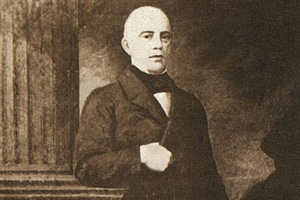When the new Assembly (1823) took over, Concepcion felt left out of the country’s administration, so the city’s troops, commanded by Ramon Freire, marched towards the capital. Upon arrival, Freire forced the Assembly to accept a call for a Congress with representatives of the three provinces (Santiago, Concepcion and Coquimbo). This congress, in a unanimous agreement, named Freire provisional supreme director (April, 1823).
During Freire’s term, slavery was definitely abolished and elections were called to form a Constituent Congress, which approved of his designation as supreme director (for a term of three years) and promulgated the Constitution of 1823 –drafted by Juan Egaña- which was derogated in July of 1824 for being to difficult to apply, since, among other characteristics, it intended to regulate the private lives of the citizens.
In 1824, new members of the Congress were chosen, but when they didn’t enact a Constitution to replace Egaña’s, Ramon Freire dissolved it in may, 1825, with the support of the majority of the citizens.
Economic problems
In 1823, the financial crisis the country was going through since the Independence war grew even worse.
Besides having problems paying public officials and the armed forces, the government was incapable of paying the installments on the loan O’Higgins had asked Engalnd for during his rule.
Faced with this scenario, Freire decided to grant a concession –for ten years- for the monopoly of sales of products like tobacco, cards and licor that belonged to the State. It was awarded –in August, 1824- to the company made up by businessmen Diego Portales, Jose Manuel Cea and others, who, in exchange, had to take on the national debt.
The bid turned out to be a terrible deal for the company because contraband of products within the monopoly and the corruption of some public officials caused a drop off in the sales that had been forecasted. Finally, the firm went broke in 1826 and the monopoly went back to the treasury.
The federal test
The federalist tendency won the elections held in July of 1826. this way, a new Constituent Congress was organized, mostly composed of federalists. Faced with this situation, Ramon Freire resigned and the new assembly named Manuel Blanco Encalada president of the Republic (the first to hold this title).
He received consultation from Jose Manuel Infante and priest Jose Ignacio Cienfuegos, who quickly enacted laws to establish the federalist model. Two standouts among these measures were the division of the country into eight provinces (Coquimbo, Aconcagua, Santiago, Colchagua, Maule, Concepcion, Valdivia and Chiloe) and the election of all authorities by popular vote.
Scandals and revolts
In September, 1826, the financial crisis was yet to die down and president Blanco Encalada preferred to leave his position. He was replaced by his vice-president Agustin de Eyzaguirre, who faced the problems of the State and army officials’ unpaid salaries. The latter mutinied to show their unhappiness.
On top of this, the new government model caused problems at the provinces’ borders and in the elections of parish priests, generating total chaos in the country.
In this environment, the more radical federalists –commanded by Enrique Campino- attempted a coup d’état in January, 1827, entering Congress and taking the conservative congressmen (pelucones) and estanqueros prisoners.
Despite all of this, the victory of the exalted federalists was brief, because, from prison, Portales urged major Nicolas Maruri to organize a counterrevolution, who defeated and incarcerated Campino and his allies. Congress was reestablished and Ramon Freire was provisionally named president, later being substituted by Francisco Antonio Pinto (May of 1827), who took charge of suspending federal laws.
Liberal Constitution of 1828
In order to organize the State, elections to elect a new Constituent Congress were held during the first days of January, 1828. the wining side of the voting were the liberals, who received the support of the pipiolos and the federalists.
The new Constitution enacted in 1828 (drafted by Jose Joaquin de Mora) stipulated the election of a president and vice-president, plus a bicameral legislative power and a judicial power in hands of the Supreme Court.
With the new regulations approved, elections were held in 1829.
The sides in dispute for the votes were the constitutionalists (liberals, pipiolos, and federalists) and the opposition, with a heavy presence of pelucones, O’Higginistas and estanqueros. The voting was intervened by the liberals, who achieved victory for their candidate, Francisco Antonio Pinto (July, 1829). However, the president elect refused to assume power (due to his advanced age and health issues), so Congress decided that his position should be taken by liberal Joaquin Vicuña, whom had been assigned with the position of vice-president (despite coming in fourth in the elections).
Internal Conflicts between 1829 and 1830
On november 7th, an open cabildo decided to depose Vicuñas and designate an Assembly (Junta) with the objective of holding new elections. The provinces of Concepcion, Colchagua and Aconcagua did not acknowledge the new government and the southern army advanced towards Santiago. This is how the inevitable confrontation at Ochagavia took place (December 14th, 1829), without showing a clear victor.
An armistice was agreed on, leaving both armies and the command of the nation in the hands of Ramon Freire. Meanwhile, a plenipotentiary congress got together, made up of representatives form all provinces. It was agreed to name a new Assembly, which was constituted by three conservatives, and it was also agreed to destitute Freire (February, 1830) and name Francisco Ruiz-Tagle as president. Due to the pressure coming from the estanqueros, he left his position to Jose Tomas Ovalle, who gave Portales the position of minister of the Interior.
As they were apart from the government group, the liberals and Freire sympathizers joined forces to face the conservative forces (commanded by Prieto) at the battle of Lircay (April 1830). In said battle, Freire’s troops were defeated, leaving the power of the country in the hands of the pelucones.








